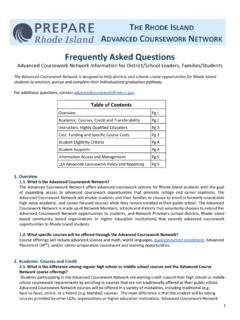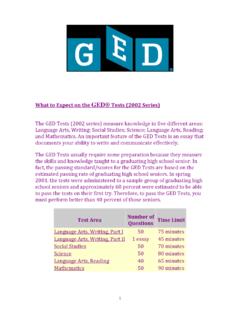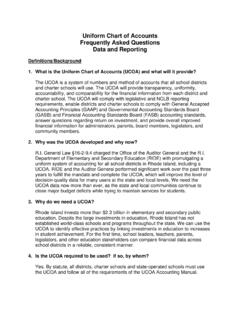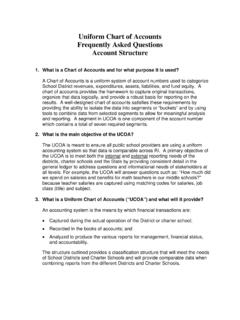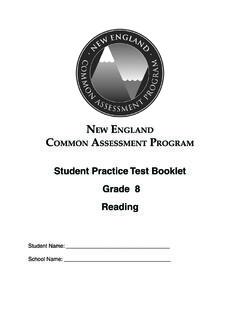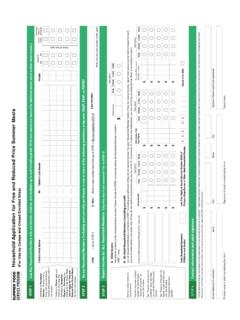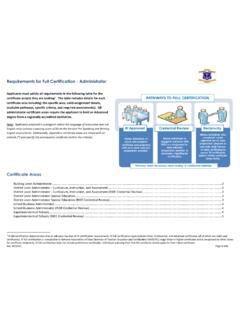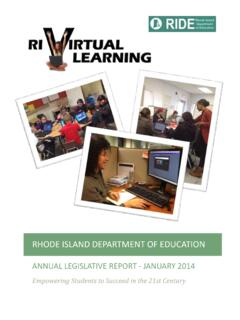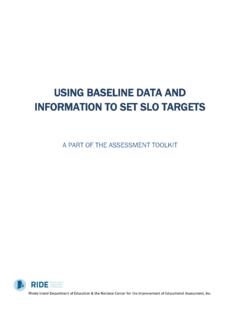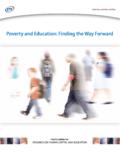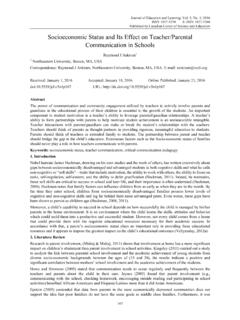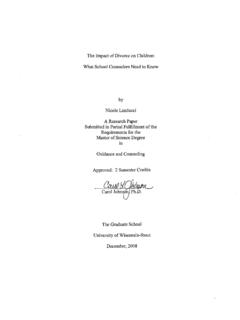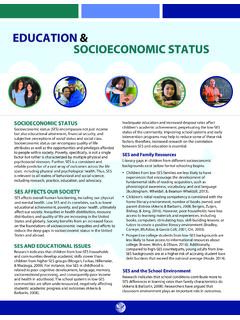Transcription of FAMILY SCHOOL RELATIONSHIPS SURVEY - Rhode Island
1 FAMILY - SCHOOL RELATIONSHIPS SURVEYPANORAMA EDUCATION September 2015 USER GUIDEO verview Schools that can get families more engaged ind that their students earn higher grades, score higher on tests, develop better social skills, and are more likely to graduate. In her book A New Wave of Evidence: he Impact of SCHOOL , FAMILY , and Community Connections on Student Achievement, Dr. Karen Mapp describes FAMILY involvement as key to improving students academic and social outcomes, as well as improving SCHOOL climate as a whole. FAMILY engagement is no longer viewed as a one-way street. According to Dr. Mapp, FAMILY - SCHOOL RELATIONSHIPS are still about how schools can more effectively engage parents and guardians. But developing parents capacity to contribute to their children s learning is just as important.
2 His different approach to thinking about FAMILY - SCHOOL dynamics requires understanding these RELATIONSHIPS as partnerships between groups of stakeholders invested in student success. he irst step towards building these partnerships is to measure parent and families attitudes and perceptions about their ties to their children s schools. he FAMILY - SCHOOL RELATIONSHIPS SURVEY was developed to provide schools with a clear picture of FAMILY attitudes about an array of topics. he SURVEY covers topics like parent engagement, parent support, SCHOOL climate, and parent efficacy. he SURVEY helps schools assess their strengths and areas for improvement in a number of key areas. Who Should Use This SURVEY ? he FAMILY - SCHOOL RELATIONSHIPS SURVEY is designed to be used by principals, district staff, SCHOOL boards, state Departments of Education, or parent/teacher organizations.
3 He SURVEY can be administered to any K-12 SCHOOL community (public, private, independent, charter, urban, or rural) and has already been used by thousands of schools nationwide. Research Process Dr. Hunter Gehlbach led the development of the FAMILY - SCHOOL RELATIONSHIPS SURVEY . Dr. Gehlbach is an Associate Professor at UC Santa Barbara s Gevirtz Graduate SCHOOL of Education, a leading SURVEY methodologist and education researcher, and a former high SCHOOL social studies teacher. Dr. Gehlbach also serves as the Director of Research at Panorama Education. Joining the research team were Co-Principal Investigators Dr. Karen Mapp and Dr. Richard Weissbourd, both from the Harvard Graduate SCHOOL of Education. hrough a rigorous development process, the research team designed the FAMILY - SCHOOL RELATIONSHIPS SURVEY using a six-step system that adhered to best practices in the science of SURVEY design.
4 His process included an extensive literature review, focus groups, synthesis, expert review, and cognitive THE SURVEY2 Using the SURVEY The FAMILY - SCHOOL RELATIONSHIPS SURVEY is structured as a series of scales, or groups of questions, that work together to measure a single construct, or topic. By selecting the right scales (rather than picking individual questions), educators can choose exactly what they wish to measure while maintaining the accuracy of the SURVEY instrument. Each scale asks parents and guardians to respond to questions as opposed to rating their level of agreement or disagreement with statements as many surveys do. By phrasing SURVEY items in an easy-to-understand format that is familiar to them, the SURVEY seems more like a conversation or a dialogue with the SCHOOL . More importantly, this approach minimizes measurement error.
5 He SURVEY can be used by schools to gather feedback for a variety of purposes. Educators may use the SURVEY to determine strengths and areas for improvements as a needs assessment. Many schools examine results across different groups of parents to see how different groups view the SCHOOL . Other schools measure change in families attitudes over time. Using the SURVEY consistently over time allows educators to identify important trends in parent attitudes as their children transition from one SCHOOL to the next. If a SCHOOL has made outreach efforts to new families , this SURVEY can be used to evaluate the effectiveness of these interventions and can be a key source of stakeholder feedback. Fundamentally, the SURVEY is designed to give educators the data they need to build more effective partnerships between schools and families .
6 He research team behind the FAMILY -Schools Relationship SURVEY encourages educators to message the SURVEY to families as an opportunity to tell the schools what they can do to: support student learning outside of SCHOOL , make the SCHOOL a more welcoming place, and build lasting partnerships between families and schools. In the following pages, we outline the scales associated with the FAMILY - SCHOOL RELATIONSHIPS SURVEY . You will also ind additional SURVEY items, including open-ended and demographic questions, that many schools may choose to incorporate. We are excited about the power of this new SURVEY tool to help schools build stronger RELATIONSHIPS with parents and families . If we can provide you with support in using the scales, please contact Engagement p. 6 he degree to which families become involved with and interact with their child s SCHOOL .
7 Example Question: How often do you meet in person with teachers at your child's SCHOOL ? SCHOOL Fit p. 7 families perceptions of how well a SCHOOL matches their child's developmental needs. Example Question: How well do you feel your child s SCHOOL is preparing him/her for his/her next academic year? FAMILY Support p. 8 families perceptions of the amount of academic and social support that they provide their child with outside of SCHOOL . Example Question: How often do you and your child talk when s/he is having a problem with others? FAMILY Efficacy p. 9 How conident families are with regard to key parenting skills. Example Question: How conident are you in your ability to support your child's learning at home? Learning Behaviors p. 10 families perceptions of their child s learning-related behaviors.
8 Example Question: How much effort does your child put into SCHOOL -related tasks? SCHOOL Climate p. 11 Perceptions of the overall social and learning climate of the SCHOOL . Example Question: To what extent do you think that children enjoy going to your child's SCHOOL ? Grit p. 12 Perceptions of how well students are able to persevere through setbacks to achieve important long-term goals. Example Question: If your child fails to reach an important goal, how likely is s/he to try again? Barriers to Engagement p. 13 Factors that can create challenges for families to interact with or become involved with their child s SCHOOL . Example Question: How big of a problem are the following issues for becoming involved with your child's current SCHOOL ?WHAT IT MEASURES4 Roles and Responsibilities p.
9 14 Perceptions of who should be primarily responsible for SCHOOL success. Example Question: Who is primarily responsible for ensuring good communication between home and SCHOOL ? SCHOOL Safety p. 15 Perceptions of student physical and psychological safety at SCHOOL . Example Question: How likely is it that someone from your child s SCHOOL will bully him/her online? Free Responses p. 16 Open-ended questions about a variety of topics that may be of interest to many schools. Example Question: What can the SCHOOL do to help your child engage in learning activities more productively at home? Background Questions p. 18 Demographic questions about SURVEY -takers that could be included in the SURVEY and may be of interest to many schools. Example Question: What is your race or ethnicity?Dr. Hunter Gehlbach is the Director of Research at Panorama Education and an Associate Professor of Education at UC Santa Barbara s Gevirtz Graduate SCHOOL of Education.
10 He is an educational psychologist with an academic focus in helping social scientists and practitioners design better surveys and questionnaires. He is particularly interested in helping schools think about ways to use surveys to improve teacher and student outcomes, and teaches classes in each of these areas at UC Santa Barbara. After graduating with a from Swarthmore College in psychology and education, Dr. Gehlbach taught high SCHOOL social studies before returning to SCHOOL for a in SCHOOL counseling from the University of Massachusetts-Amherst and a in educational psychology from Stanford. 5 FAMILY Engagement he degree to which families become involved with and interact with their child s SCHOOL . ItemResponsesHow often do you meet in person with teachers at your child's SCHOOL ?
